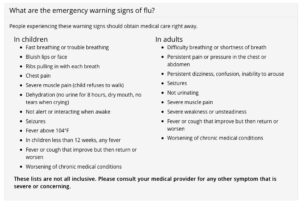The following information is from CDC.gov
It has been recognized for many years that people 65 years and older are at greater risk of serious complications from the flu compared with young, healthy adults because human immune defenses become weaker with age. While flu seasons can vary in severity, during most seasons, people 65 years and older bear the greatest burden of severe flu disease. In recent years, for example, it’s estimatedExternal that between about 70 percent and 90 percent of seasonal flu-related deaths have occurred in people 65 years and older and between 50 percent and 70 percent of seasonal flu-related hospitalizations have occurred among people in that age group. So influenza is often quite serious for people 65 and older.
A Flu Vaccine is the Best Protection Against Flu
Flu vaccination has been shown to reduce flu illnesses and more serious flu outcomes that can result in hospitalization or even death in older people. For example, a 2017 study showed that flu vaccination reduced deaths, intensive care unit (ICU) admissions, ICU length of stay, and overall duration of hospitalization among hospitalized flu patients; with the greatest benefits being observed among people 65 years of age and older.
The best way to protect against flu and its potentially serious complications is with a CDC recommends that everyone 6 months of age and older get a seasonal flu vaccine each year by the end of October. However, as long as flu viruses are circulating, vaccination should continue throughout flu season, even in January or later.
Flu vaccination is especially important for people 65 years and older because they are at high risk of developing serious complications from flu. Flu vaccines are updated each season as needed to keep up with changing viruses. Also, immunity wanes over a year so annual vaccination is needed to ensure the best possible protection against influenza. A flu vaccine protects against the flu viruses that research indicates will be most common during the upcoming season. (See Vaccine Virus Selection for this season’s exact vaccine composition.) The 2018-2019 flu vaccine has been updated from last season’s vaccine to better match circulating viruses. Immunity from vaccination sets in after about two weeks.
Older people with weaker immune systems often have a lower protective immune response after flu vaccination compared to younger, healthier people. This can make them more susceptible to the flu. Although immune responses may be lower in the elderly, vaccine effectiveness has been similar in most flu seasons among older adults and those with chronic health conditions compared to younger, healthy adults. Despite the fact that older adults have weaker immune responses to vaccine flu vaccines, there are many reasons why people in that age group should be vaccinated each year.
Types of Flu Shots for People 65 and Older
People 65 years and older should get a flu shot and not a nasal spray vaccine. They can get any flu vaccine approved for use in that age group with no preference for any one vaccine over another. There are regular flu shots that are approved for use in people 65 and older and there also are two vaccines designed specifically for people 65 and older:
The “high dose vaccine” contains 4 times the amount of antigen as a regular flu shot. It is associated with a stronger immune response following vaccination (higher antibody production). Results from a clinical trial of more than 30,000 participants showed that adults 65 years and older who received the high dose vaccine had 24% fewer influenza infections as compared to those who received the standard dose flu vaccine. The high dose vaccine has been approved for use in the United States since 2009. Learn more about high dose flu vaccine here.
The adjuvanted flu vaccine, Fluad, is made with MF59 adjuvant an additive that creates a stronger immune response to vaccination. In a Canadian observational study of 282 people aged 65 years and older conducted during the 2011-12 season, Fluad was 63% more effective than regular-dose unadjuvanted flu shots. There are no randomized studies comparing Fluad with Fluzone High-Dose. This vaccine was available for the first time in the United States during the 2016-2017 season. Learn more about adjuvanted flu vaccine here.High Dose and Adjuvanted Flu
Vaccine Side Effects
The high dose and adjuvanted flu vaccines may result in more of the mild side effects that can occur with standard-dose seasonal shots. Mild side effects can include pain, redness or swelling at the injection site, headache, muscle ache and malaise.More information about different types of flu vaccines can be found here.
Get pneumococcal vaccines
- People who are 65 years of age and older should also be up to date with pneumococcal vaccination to protect against pneumococcal disease, such as pneumonia, meningitis, and bloodstream infections. Talk to your doctor to find out which pneumococcal vaccines are recommended for you.
- Pneumococcal pneumonia is an example of a serious flu-related complication that can cause death. You can get the pneumococcal vaccine your provider recommends when you get the flu vaccine.
Other Preventive Actions
In addition to getting the flu shot, people 65 years and older should take the same everyday preventive actions CDC recommends of everyone, including covering coughs, washing hands often, and avoiding people who are sick.Symptoms and TreatmentIf you get sick with flu symptoms call your doctor right away. There are antiviral drugs that can treat flu illness and prevent serious flu complications. CDC recommends prompt treatment for people who have influenza infection or suspected influenza infection and who are at high risk for serious flu complications, such as people 65 years and older.
Symptoms:
Flu symptoms include fever, cough, sore throat, runny or stuffy nose, body aches, headache, chills and fatigue. Some people may also have vomiting and diarrhea. People may be infected with the flu and have respiratory symptoms without a fever.
- Treatment should begin as soon as possible because antiviral drugs work best when started early (within 48 hours after symptoms start).
- For you to get an antiviral drug, a doctor needs to write a prescription. These medicines fight against flu by keeping flu viruses from making more viruses in your body.
- Antiviral drugs can make your flu illness milder and make you feel better faster. They may also prevent serious health problems that can result from flu illness.
- There are three FDA-approved influenza antiviral drugs recommended by CDC this season that can be used to treat the flu.
When to Seek Emergency Medical Care
If you experience any of the following emergency warning signs of flu sickness, seek medical attention right away!







